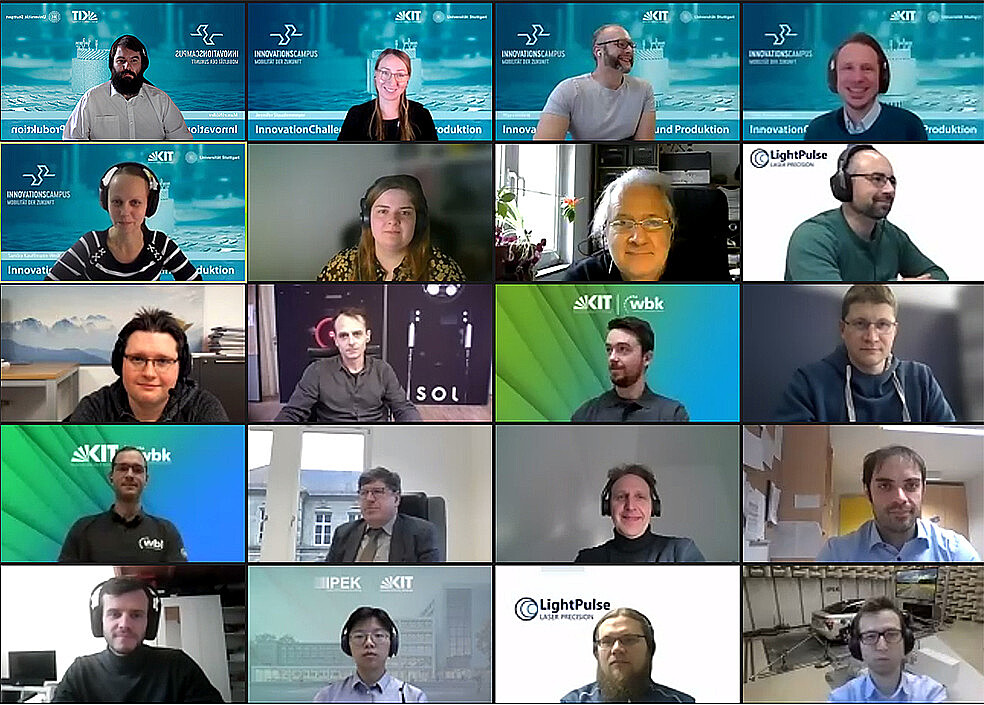Published on December 07, 2021
ICM InnovationChallenge Hackathon: It's a Match!

There is a suitable answer to every question. With the new InnovationChallenge Mobility and Production, the InnovationCampus Mobility of the Future (ICM) aims precisely at this finding process. The ICM is an association of University of Stuttgart and Karlsruhe Institute of Technology (KIT). Together, the collaborators are working to help shape the future of mobility and strengthen innovation in Baden-Wuerttemberg.
The heart of InnovationChallenge is the hackathon, which took place virtually on November 18. Prof. Thomas Hirth, KIT Vice President for Innovation and International Affairs, welcomed the researchers and company representatives to the interactive, four-hour event. Science and industry met in a total of 15 exciting pitches of 40 minutes each. It was the researchers who wanted to bring light into the darkness: They presented their elaborated solution approaches to the entrepreneurial challenges. After the hackathon, it was up to the companies to decide which pitch was the missing puzzle piece. The project consortia formed as a result ultimately apply for funding from Baden-Wuerttemberg Ministry of Science - much easier and faster than regular funding procedures.
What participants and organizers think
Participating in the hackathon and funding process is a win-win situation, as Jennifer Staudenmeyer from Baden-Wuerttemberg Ministry of Science explains:
"Through the fast and uncomplicated funding of InnovationChallenge Mobility and Production, we enable, on the one hand, small and medium-sized companies to get the necessary push to further develop research questions for which they would otherwise have little time or capacity. For the research community, in turn, it is interesting that their approaches can be quickly realized and that they can simultaneously work in a particularly practical manner as well as on the cutting edge through collaboration with new and medium-sized companies."
Daniel Beckers from medium-sized company Rosswag has a similar opinion from a company's point of view:
"For us, fast time-to-market is very important. Sometimes we carry projects around for months and nothing happens. With InnovationChallenge, we got a fast yet mature solution with the prospect of funding, but without long feedback loops. In addition, we can support the region through local collaboration."
Young entrepreneur Theo Sailer from MoThor Batteries, who is studying at KIT, became aware of the format through conversations and has come to stay:
"The pitch was really productive. The concept with 40-minute presentations also allowed us to go deeper into issues, which is something we have missed in other hackathon formats in the past. We will be happy to participate again in the future if we have a suitable use case."
Researchers, such as Patrick Fischmann from Institute of Production Science (wbk) at KIT, also end the day with a positive and hopeful mindset:
"The hackathon is a new and fast format with a lot of potential. We would be happy to see more challenges in the future."
Announcement of funding in December
The participating companies had until November 30 to join forces with the university - whose pitch was most convincing - in the project consortium and submit an application for funding to Baden-Wuerttemberg Ministry of Science. In the multi-stage bidding process that followed, various factors, such as the company's own financial contribution and size, were taken into account when allocating the funding. Which consortia received funding for their projects was announced by Baden-Wurttemberg Ministry of Science on December 14, 2021.
You can find an overview of the funded projects here.

comments about this article
No Comments